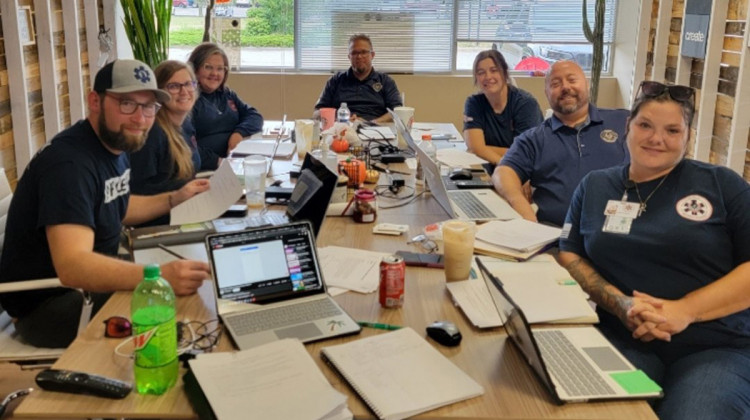
Phoenix Paramedic Solutions CEO and President Nathaniel Metz said the presence of peer support professionals — and how he restructured his organization to support them — has had a positive impact on paramedics and EMTs.
Phoenix Paramedic Solutions / XCertified peer support professionals can be an important addition to health care spaces by providing care to people with substance use disorder. But sometimes stigma can get in the way of those benefits. One paramedicine provider said more companies need to create spaces that support those peer professionals.
Peer support professionals use their own lived experience with mental health and substance use issues to assist people in the recovery process.
Nathaniel Metz, president and CEO of Phoenix Paramedic Solutions, said peer support professionals are an important resource, and employing them comes with the responsibility to create a space that acknowledges peers are almost always people in recovery.
“Our mission wasn't just going to be outwardly facing, it had to be inward facing,” Metz said. “If we're a humanities company and we say we're here to help people, I don't think I should stop with clients versus employees.”
Metz said maintaining employment and benefits is important to support his employees through their recovery — even through the potential of a relapse. He said hiring peers comes with the responsibility to create a space that acknowledges they are almost always people in recovery.
“Our own internal employment and career pathway within our organization has become a recovery pathway in and of itself,” Metz said. “Giving individuals in our community a chance to come through, make some money and create another impact on another human being is powerful for their own recovery.”
In addition, that space can also be beneficial for other employees.
“Their vulnerability became contagious,” Metz said. “Now, everybody else in our organization started being vulnerable about their issues that we didn't know about previously.”
Join the conversation and sign up for the Indiana Two-Way. Text "Indiana" to 765-275-1120. Your comments and questions in response to our weekly text help us find the answers you need on statewide issues.
The rates of mental health and substance use issues among first responders is much higher than the general public. Metz said the presence of peers — and how he restructured his organization to support them — has had a positive impact on the paramedics and EMTs.
“We're learning how to discuss these things internally with one another so that we continue to watch out for each other,” Metz said. “Since that time, our entire staff has gotten healthier, happier, and we're actually doing a lot better with our work. We're more creative and people are testing themselves in ways that we've never done before.”
Metz said that environment also makes it easier to retain his workforce during difficult times, including at the height of COVID-19.
Abigail is our health reporter. Contact them at aruhman@wboi.org.
 DONATE
DONATE






 Support WFYI. We can't do it without you.
Support WFYI. We can't do it without you.